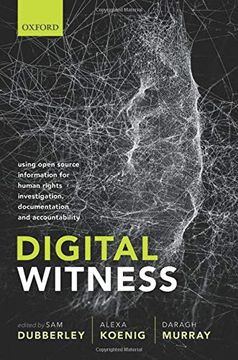Share
Digital Witness: Using Open Source Information for Human Rights Investigation, Documentation, and Accountability
Daragh Murray
(Illustrated by)
·
Sam Dubberley
(Illustrated by)
·
Alexa Koenig
(Illustrated by)
·
Oxford University Press, USA
· Paperback
Digital Witness: Using Open Source Information for Human Rights Investigation, Documentation, and Accountability - Dubberley, Sam ; Koenig, Alexa ; Murray, Daragh
£ 44.54
£ 49.49
You save: £ 4.95
Choose the list to add your product or create one New List
✓ Product added successfully to the Wishlist.
Go to My WishlistsIt will be shipped from our warehouse between
Friday, May 10 and
Monday, May 13.
You will receive it anywhere in United Kingdom between 1 and 3 business days after shipment.
Synopsis "Digital Witness: Using Open Source Information for Human Rights Investigation, Documentation, and Accountability"
From videos of rights violations, to satellite images of environmental degradation, to eyewitness accounts disseminated on social media, human rights practitioners have access to more data today than ever before. To say that mobile technologies, social media, and increased connectivity are having a significant impact on human rights practice would be an understatement. Modern technology - and the enhanced access it provides to information about abuse - has the potential to revolutionise human rights reporting and documentation, as well as the pursuit of legal accountability. However, these new methods for information gathering and dissemination have also created significant challenges for investigators and researchers. For example, videos and photographs depicting alleged human rights violations or war crimes are often captured on the mobile phones of victims or political sympathisers. The capture and dissemination of content often happens haphazardly, and for a variety of motivations, including raising awareness of the plight of those who have been most affected, or for advocacy purposes with the goal of mobilising international public opinion. For this content to be of use to investigators it must be discovered, verified, and authenticated. Discovery, verification, and authentication have, therefore, become critical skills for human rights organisations and human rights lawyers. This book is the first to cover the history, ethics, methods, and best-practice associated with open source research. It is intended to equip the next generation of lawyers, journalists, sociologists, data scientists, other human rights activists, and researchers with the cutting-edge skills needed to work in an increasingly digitized, and information-saturated environment.

